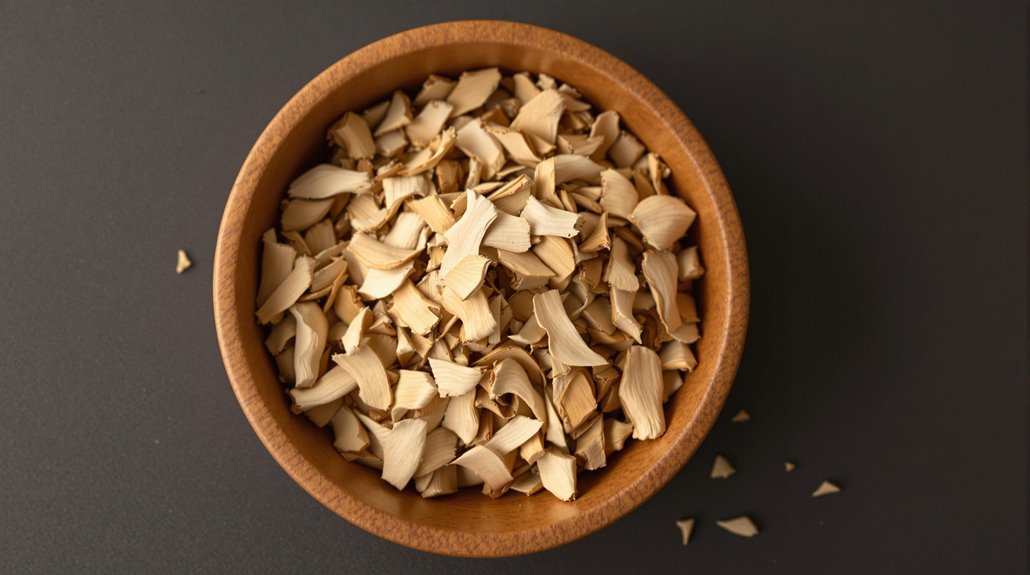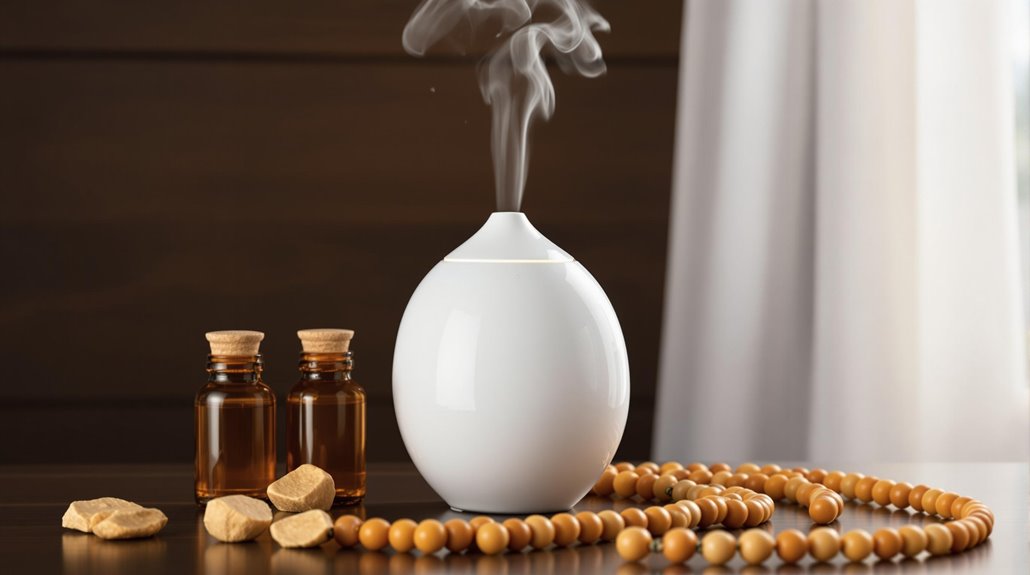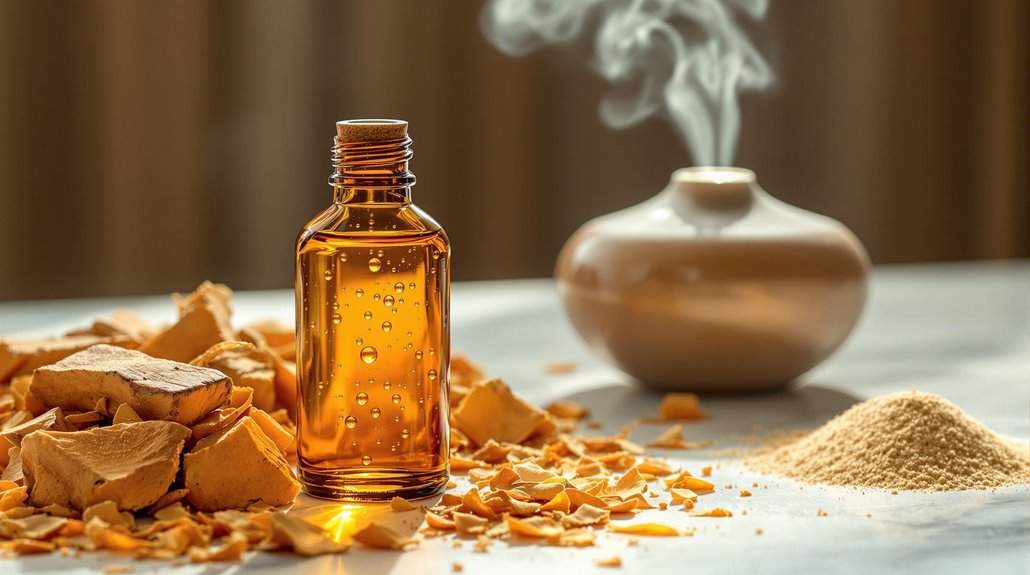Why Is Sandalwood Popular in Spiritual Practices?

Sandalwood is revered in spiritual practices for its deep aromatic properties that promote calmness and clarity. Its warm, earthy scent quiets mental chatter, anchoring one's awareness in the present moment to enhance meditation and mindfulness. Across cultures, sandalwood is associated with purity, grounding, and divine connection - it's crafted into sacred objects, burned as incense, and used in purification rituals. Its versatility extends from Hindu temples to Buddhist ceremonies and Native American smudging, making it a cherished element in many spiritual traditions. If you'd like to investigate deeper into sandalwood's enduring appeal, let's examine its rich history and symbolic significance.
Spiritual Significance of Sandalwood
Sandalwood has long been revered for its spiritual significance across various cultures and traditions. Its aromatic essence is believed to promote feelings of calmness and clarity, making it a popular choice for purification rituals and meditation practices. The warm, earthy scent of sandalwood is thought to harmonize energetic vibrations, creating a serene and grounding atmosphere.
When burned as incense or oil, sandalwood can help clear stagnant energy and facilitate a deeper connection with the divine. Its soothing properties are said to open the heart chakra, allowing for greater self-reflection and emotional balance. Many spiritual practitioners incorporate sandalwood into their rituals and ceremonies, using it to create sacred spaces and enhance their meditative experiences.
Beyond its aromatic qualities, the wood itself is often carved into sacred objects, such as malas and prayer beads, further emphasizing the spiritual significance of this extraordinary plant. Ultimately, the versatility and impactful effects of sandalwood have solidified its place in various spiritual traditions worldwide. The oil's ability to trigger emotional healing makes it particularly valuable in spiritual practices focused on mental and emotional well-being.
Aromatic Properties and Meditation
When burned or diffused, the aromatic properties of sandalwood can enhance your meditation practice by promoting a sense of calm and clarity. The earthy, warm scent of sandalwood is known to have a calming effect on the mind, allowing you to sink deeper into your meditative focus.
- The rich, woody aroma of sandalwood can help quiet the chatter of your thoughts, making it easier to achieve a state of inner peace and presence.
- The calming effects of sandalwood can also help reduce feelings of stress and anxiety, creating a more conducive environment for your meditation practice.
- The subtle, grounding scent of sandalwood can anchor your awareness in the present moment, preventing your mind from wandering and helping you maintain meditative focus.
- The soothing aroma of sandalwood may also stimulate the production of calming neurotransmitters like serotonin, further enhancing the meditative experience.
- Incorporating sandalwood into your meditation practice, whether through incense, essential oils, or other forms, can deepen your connection to the sacred and promote a sense of inner tranquility.
Creating a blend of 8 drops sandalwood with mandarin, palma rosa, and vetiver in a diffuser can help achieve a deeply relaxed state for meditation.
Sandalwood in Religious Ceremonies

Beyond its meditative properties, you'll find sandalwood deeply rooted in various religious ceremonies and spiritual practices across cultures. For instance, in Hinduism, sandalwood paste is used in purification ceremonies, as it's believed to have cleansing and purifying properties. The fragrant wood is also commonly used to craft mala beads, which serve as meditation aids during spiritual practices. Similarly, in Buddhist traditions, sandalwood incense is burned during meditation and ceremonies to create a calming, sacred atmosphere.
The wood's warm, earthy aroma is said to facilitate deeper states of consciousness and connection. Additionally, in some Native American rituals, sandalwood smoke is used to cleanse and bless sacred spaces. Across faiths, the versatile sandalwood has become an integral part of many religious ceremonies, lending its unique aromatic qualities to enhance spiritual experiences. Its steam distillation process produces the essential oils used in many of these sacred ceremonies, particularly from the heartwood of Indian and Australian sandalwood species.
Symbolic Meaning and Rituals
It's not just the fragrance that draws people to sandalwood - the wood holds deep symbolic meaning and is incorporated into a variety of revered rituals across cultures. From its sacred symbolism to its mystical associations, sandalwood has long been revered for its spiritual properties.
- In Hinduism, sandalwood is considered a sacred wood used in temple rituals, meditation, and anointing deities.
- Buddhist temples often feature sandalwood carvings, and the wood is burned as incense during ceremonies.
- In some Native American traditions, sandalwood is incorporated into smudging rituals to cleanse and purify sacred spaces.
- Ayurvedic practitioners use sandalwood in various formulations to promote mental and spiritual well-being.
- Across many belief systems, sandalwood is associated with purity, grounding, and connection to the divine.
The calming aroma of sandalwood incense helps create a meditative atmosphere while naturally purifying the air without harsh chemicals. Ultimately, the enduring appeal of sandalwood in spiritual practices lies in its ability to create a sense of tranquility, focus, and reverence for the sacred.
Versatility in Spiritual Practices
The versatility of sandalwood extends well beyond its symbolic meaning, making it a precious tool in a variety of spiritual practices. Its calming effects and meditative qualities make it an ideal companion for those seeking deeper connection and inner peace. From incense to essential oils, sandalwood can be used to create a serene environment that supports contemplation and self-reflection. Its warm, earthy aroma can promote relaxation, helping to quiet the mind and ease anxious thoughts.
Sandalwood's versatility allows practitioners to incorporate it into diverse rituals, whether it's the burning of incense during meditation or the application of essential oils during massage. This multifaceted nature of sandalwood enables spiritual seekers to tailor their practices to their individual needs and preferences, making it an indispensable resource on the expedition of self-discovery and personal growth.
The wood's antimicrobial properties contribute to its purifying effects during spiritual ceremonies, enhancing its significance in religious traditions.
Enduring Appeal of Sandalwood

Centuries of reverence have cemented sandalwood's enduring appeal as a cherished natural treasure. Its soothing aroma and therapeutic benefits have made it a staple in spiritual practices worldwide.
- The warm, woody scent of sandalwood is believed to promote relaxation and focus, making it a popular choice for meditation, yoga, and other mindfulness practices.
- The essential oil derived from sandalwood is often used in aromatherapy to alleviate stress, anxiety, and insomnia, providing a calming influence to the mind and body.
- Sandalwood's antiseptic and anti-inflammatory properties have made it a common ingredient in various religious and cultural rituals, from Hindu puja ceremonies to Buddhist incense ceremonies.
- The wood itself is highly valued for its ability to hold a flame and burn slowly, making it a preferred choice for creating sacred space and cleansing rituals.
- The versatility of sandalwood, from its use in personal care products to its spiritual significance, has solidified its status as a timeless and revered natural resource.
Traditional practitioners often recommend deep inhalation techniques while using sandalwood to enhance its grounding and balancing effects on the body's energy flow.




